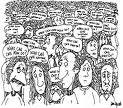
By Dr Tony Kearon
If recent media stories are to be believed, apparently scientists have suggested that the study of bees can help to catch serial killers .
I’ll resist the temptation to make a joke about beehive-ioral psychology, not least because these news reports unwittingly say something quite interesting about how academic research is often presented to a wider audience by the media. The actual research article itself, published online in the Journal of the Royal Society Interface in July 2008, spectacularly fails to live up to the media hype (and I mean that in a good way). The authors suggest that methods of geographical profiling developed to explore the behaviour of serial offenders (not just serial killers) can be applied to the study of foraging behaviour in animals. Almost as an aside they suggest that if these profiling methods are applied to a much wider range of subjects (like bees) this may help to develop and refine the methodology of geographical profiling in general. It is that final innocuous statement that has spawned the media hype.
However, what ever the possible relationship between the behaviour of offenders and foraging animals, I can't pass up the chance to say something about geographical profiling and the extent to which it may (or may not) help in the fight against crime.
Geographical profiling is predicated on certain assumptions about the spatial distribution and patterning of human behaviour. Humans are domocentric – most of our activities are carried out within a short distance of our domestic space. What ever some of us may think, criminals are human too, and in this respect their criminal activities tend to follow the same pattern of local activity (for example, known burglars committed most of their offences within a 2-3 mile radius of their domestic space). Where crime tends to differ from other forms of activity is that offenders often try to maintain a ‘buffer zone’ around their domestic space when it comes to their criminal activities. If I regularly put on a mask and rob convenience stores at gunpoint (one of my many hobbies), I am unlikely to rob the store at the end of my own street because someone might recognise my voice, clothes, mannerisms, or might see me leave the store after the robbery and enter my own house.
In a very simplified version of geographical profiling, if we map the location of offences committed by a serial offender, ideally we should see something resembling a ring doughnut, a cluster of offences within which is an area where no offences were committed – the buffer zone the offender keeps between his/her offences and domestic space. Brilliant - in the process of trying to avoid detection, ironically the offender pretty much tells us where they live – what’s not to like about this approach?
One problem is that it is actually more difficult than we think to link specific unsolved offences to particular unknown suspects. There is a depressing uniformity about the methods employed in burglaries, street robberies and many violent offences (and in the physical descriptions of their perpetrators) that often make it quite difficult to say with certainty which offences were carried out by one unknown serial offender. Alternatively, in more serious cases like serial murder, while the links between serial offences may be more obvious, the relative scarcity of the offences means that when they are mapped, no nice unproblematic single buffer zone emerges on the map.
In both of these situations, most of what we know about the spatial distribution of serial offending comes from the analysis of offenders who have already been caught and the offences they admit to committing, so at present, the ability of geographical profiling to actually help identify unknown offenders is somewhat limited.
Geographical profiling also has to contend with human agency. Unlike bees, serial offenders may actually be aware of news coverage, or even research, relating to their behaviour. It is possible for serial offenders to make changes to their patterns of offending to disguise the relationship between individual offences. They could even avoid committing crimes in particular areas some distance from their own locale to try to create false buffer zones.
These are some of the reasons why, as a Criminologist, I am interested in geographical profiling. It has the potential to make important contributions to our understanding of the spatial patterning of offending in our society. It is rooted in a quite simple set of assumptions about human behaviour, but once it is applied to real offenders in their complex social contexts it produces a picture which is much more fragmented, speculative and incomplete. This means that it bears all the hallmarks (and problems) of the classic Criminological 'big idea'. It has a superficially simple common sense appeal that could be taken up and over emphasised by sections of the media (and ultimately by politicians looking for the next crime solution to offer the electorate). But the underlying complexities of geographical profiling in practice mean that it would never be able to deliver the 'magic bullet' that such simple accounts seem to promise.
So in the run up to a General Election in which 'The Crime Problem' will feature heavily, I'm honestly not too bothered if the media want to make links between serial killers and bees – but I really hope they don't discover the apparent delights of the geographical profiling of offenders.
If recent media stories are to be believed, apparently scientists have suggested that the study of bees can help to catch serial killers .
I’ll resist the temptation to make a joke about beehive-ioral psychology, not least because these news reports unwittingly say something quite interesting about how academic research is often presented to a wider audience by the media. The actual research article itself, published online in the Journal of the Royal Society Interface in July 2008, spectacularly fails to live up to the media hype (and I mean that in a good way). The authors suggest that methods of geographical profiling developed to explore the behaviour of serial offenders (not just serial killers) can be applied to the study of foraging behaviour in animals. Almost as an aside they suggest that if these profiling methods are applied to a much wider range of subjects (like bees) this may help to develop and refine the methodology of geographical profiling in general. It is that final innocuous statement that has spawned the media hype.
However, what ever the possible relationship between the behaviour of offenders and foraging animals, I can't pass up the chance to say something about geographical profiling and the extent to which it may (or may not) help in the fight against crime.
Geographical profiling is predicated on certain assumptions about the spatial distribution and patterning of human behaviour. Humans are domocentric – most of our activities are carried out within a short distance of our domestic space. What ever some of us may think, criminals are human too, and in this respect their criminal activities tend to follow the same pattern of local activity (for example, known burglars committed most of their offences within a 2-3 mile radius of their domestic space). Where crime tends to differ from other forms of activity is that offenders often try to maintain a ‘buffer zone’ around their domestic space when it comes to their criminal activities. If I regularly put on a mask and rob convenience stores at gunpoint (one of my many hobbies), I am unlikely to rob the store at the end of my own street because someone might recognise my voice, clothes, mannerisms, or might see me leave the store after the robbery and enter my own house.
In a very simplified version of geographical profiling, if we map the location of offences committed by a serial offender, ideally we should see something resembling a ring doughnut, a cluster of offences within which is an area where no offences were committed – the buffer zone the offender keeps between his/her offences and domestic space. Brilliant - in the process of trying to avoid detection, ironically the offender pretty much tells us where they live – what’s not to like about this approach?
One problem is that it is actually more difficult than we think to link specific unsolved offences to particular unknown suspects. There is a depressing uniformity about the methods employed in burglaries, street robberies and many violent offences (and in the physical descriptions of their perpetrators) that often make it quite difficult to say with certainty which offences were carried out by one unknown serial offender. Alternatively, in more serious cases like serial murder, while the links between serial offences may be more obvious, the relative scarcity of the offences means that when they are mapped, no nice unproblematic single buffer zone emerges on the map.
In both of these situations, most of what we know about the spatial distribution of serial offending comes from the analysis of offenders who have already been caught and the offences they admit to committing, so at present, the ability of geographical profiling to actually help identify unknown offenders is somewhat limited.
Geographical profiling also has to contend with human agency. Unlike bees, serial offenders may actually be aware of news coverage, or even research, relating to their behaviour. It is possible for serial offenders to make changes to their patterns of offending to disguise the relationship between individual offences. They could even avoid committing crimes in particular areas some distance from their own locale to try to create false buffer zones.
These are some of the reasons why, as a Criminologist, I am interested in geographical profiling. It has the potential to make important contributions to our understanding of the spatial patterning of offending in our society. It is rooted in a quite simple set of assumptions about human behaviour, but once it is applied to real offenders in their complex social contexts it produces a picture which is much more fragmented, speculative and incomplete. This means that it bears all the hallmarks (and problems) of the classic Criminological 'big idea'. It has a superficially simple common sense appeal that could be taken up and over emphasised by sections of the media (and ultimately by politicians looking for the next crime solution to offer the electorate). But the underlying complexities of geographical profiling in practice mean that it would never be able to deliver the 'magic bullet' that such simple accounts seem to promise.
So in the run up to a General Election in which 'The Crime Problem' will feature heavily, I'm honestly not too bothered if the media want to make links between serial killers and bees – but I really hope they don't discover the apparent delights of the geographical profiling of offenders.


